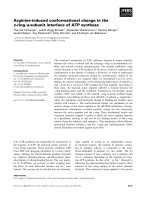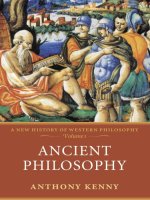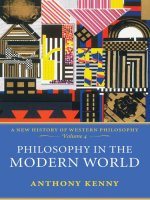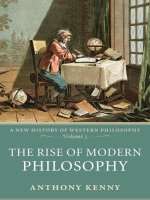- Trang chủ >>
- Khoa Học Tự Nhiên >>
- Vật lý
philosophy in the modern world a new history of western philosophy volume 4 jun 2007
Bạn đang xem bản rút gọn của tài liệu. Xem và tải ngay bản đầy đủ của tài liệu tại đây (6.46 MB, 364 trang )
Philosophy in the Modern World
This page intentionally left blank
A NEW HISTORY OF WESTERN PHILOSOPHY
volume iv
Philosophy in the Modern World
anthony
kenny
CLARENDON PRESS
:
OXFORD
3
Great Clarendon Street, Oxford ox26dp
Oxford University Press is a department of the University of Oxford.
It furthers the University’s objective of excellence in research, scholarship,
and education by publishing worldwide in
Oxford New York
Auckland Cape Town Dar es Salaam Hong Kong Karachi
Kuala Lumpur Madrid Melbourne Mexico City Nairobi
New Delhi Shanghai Taipei Toronto
With oYces in
Argentina Austria Brazil Chile Czech Republic France Greece
Guatemala Hungary Italy Japan Poland Portugal Singapore
South Korea Switzerland Thailand Turkey Ukraine Vietnam
Oxford is a registered trade mark of Oxford University Press
in the UK and in certain other countries
Published in the United States
by Oxford University Press Inc., New York
ß Sir Anthony Kenny 2007
The moral rights of the author have been asserted
Database right Oxford University Press (maker)
First published 2007
All rights reserved. No part of this publication may be reproduced,
stored in a retrieval system, or transmitted, in any form or by any means,
without the prior permission in writing of Oxford University Press,
or as expressly permitted by law, or under terms agreed with the appropriate
reprographics rights organization. Enquiries concerning reproduction
outside the scope of the above should be sent to the Rights Department,
Oxford University Press, at the address above
You must not circulate this book in any other binding or cover
and you must impose the same condition on any acquirer
British Library Cataloguing in Publication Data
Data available
Library of Congress Cataloging in Publication Data
Data available
Typeset by SPI Publisher Services, Pondicherry, India
Printed in Great Britain
on acid-free paper by
Biddles Ltd, King’s Lynn, Norfolk
ISBN 978–0–19–875279–0
13579108642
To the memory of Georg Henrik von Wright
This page intentionally left blank
SUMMARY OF CONTENTS
Contents ix
Introduction xiii
1. Bentham to Nietzsche 1
2. Peirce to Strawson 34
3. Freud to Derrida 72
4. Logic 97
5. Language 121
6. Epistemology 144
7. Metaphysics 169
8. Philosophy of Mind 192
9. Ethics 220
10. Aesthetics 250
11. Political Philosophy 269
12. God 291
Chronology 319
Abbreviations and Conventions 321
Bibliography 327
List of Illustrations 335
Index 339
This page intentionally left blank
CONTENTS
Introduction xiii
1. Bentham to Nietzsche 1
Bentham’s Utilitarianism 1
The Development of John Stuart Mill 5
Schopenhauer’s Philosophy of the Will 13
Ethics and Religion in Kierkegaard 16
Dialectical Materialism 18
Darwin and Natural Selection 24
John Henry Newman 28
Nietzsche 30
2. Peirce to Strawson 34
C. S. Peirce and Pragmatism 34
The Logicism of Frege 37
Psychology and Pragmatism in William James 43
British Idealism and its Critics 47
Russell on Mathematics, Logic, and Language 50
Wittgenstein’s Tractatus 54
Logical Positivism 58
Wittgenstein’s Later Philosophy 60
Analytic Philosophy after Wittgenstein 63
3. Freud to Derrida 72
Freud and Psychoanalysis 72
Husserl’s Phenomenology 78
The Existentialism of Heidegger 83
The Existentialism of Sartre 87
Jacques Derrida 90
4. Logic 97
Mill’s Empiricist Logic 97
Frege’s Refoundation of Logic 100
Induction and Abduction in Peirce 107
The Saga of Principia Mathematica 110
Modern Modal Logic 116
5. Language 121
Frege on Sense and Reference 121
The Pragmatists on Language and Truth 126
Russell’s Theory of Descriptions 129
The Picture Theory of the Proposition 132
Language-Games and Private Languages 137
6. Epistemology 144
Two Eloquent Empiricists 144
Peirce on the Methods of Science 150
Frege on Logic, Psychology, and Epistemology 155
Knowledge by Acquaintance and
Knowledge by Description 160
Husserl’s Epoche 162
Wittgenstein on Certainty 165
7. Metaphysics 169
Varieties of Idealism 169
Metaphysics and Teleology 174
Realism vs. Nominalism 178
First, Second, and Third in Peirce 181
The Metaphysics of Logical Atomism 185
Bad and Good Metaphysics 187
8. Philosophy of Mind 192
Bentham on Intention and Motive 192
Reason, Understanding, and Will 195
Experimental vs. Philosophical Psychology 198
The Freudian Unconscious 202
Philosophical Psychology in the Tractatus 207
Intentionality 209
Wittgenstein’s Later Philosophy of Mind 212
CONTENTS
x
9. Ethics 220
The Greatest Happiness of the Greatest Number 220
Modifications of Utilitarianism 225
Schopenhauer on Renunciation 228
The Moral Ascent in Kierkegaard 233
Nietzsche and the Transvaluation of Values 237
Analytic Ethics 242
10. Aesthetics 250
The Beautiful and the Sublime 250
The Aesthetics of Schopenhauer 255
Kierkegaard on Music 258
Nietzsche on Tragedy 260
Art and Morality 263
Art for Art’s Sake 265
11. Political Philosophy 269
Utilitarianism and Liberalism 269
Kierkegaard and Schopenhauer on Women 276
Marx on Capital and Labour 280
Closed and Open Societies 286
12. God 291
Faith vs. Alienation 291
The Theism of John Stuart Mill 297
Creation and Evolution 299
Newman’s Philosophy of Religion 305
The Death of God and the Survival of Religion 309
Freud on Religious Illusion 314
Philosophical Theology after Wittgenstein 315
Chronology 319
Abbreviations and Conventions 321
Bibliography 327
List of Illustrations 335
Index 339
CONTENTS
xi
This page intentionally left blank
INTRODUCTION
T
his is the final volume of a four-volume history of Western philosophy
from its beginnings to its most recent past. The first volume, published
in 2004, told the story of ancient philosophy, and the second volume,
published in 2005, covered medieval philosophy from the time of
St Augustine to the Renaissance. The third volume, The Rise of Modern
Philosophy, treated of the major philosophers of the sixteenth, seventeenth,
and eighteenth centuries, ending with the death of Hegel early in the
nineteenth. This present volume continues the narrative up to the final
years of the twentieth century.
There are two different kinds of reason for reading a history of philoso-
phy. Some readers do so because they are seeking help and illumination
from older thinkers on topics of current philosophical interest. Others are
more interested in the people and societies of the distant or recent past, and
wish to learn about their intellectual climate. I have structured this and
previous volumes in a way that will meet the needs of both classes of
reader. The book begins with three summary chapters, each of which
follows a chronological sequence; it then contains nine chapters, each of
which deals with a particular area of philosophy, from logic to natural
theology. Those whose primary interest is historical may focus on the
chronological surveys, referring if they wish to the thematic sections for
amplification. Those whose primary interest is philosophical will concen-
trate rather on the later chapters, referring back to the chronological
chapters to place particular issues in context.
Certain themes have occupied chapters in each of the four volumes of
this series: epistemology, metaphysics, philosophy of mind, ethics, and
philosophy of religion. Other topics have varied in importance over the
centuries, and the pattern of thematic chapters has varied accordingly. The
first two volumes began the thematic section with a chapter on logic and
language, but there was no such chapter in volume III because logic went
into hibernation at the Renaissance. In the period covered by the present
volume formal logic and the philosophy of language occupied such a
central position that each topic deserves a chapter to itself. In the earlier
volumes, there was a chapter devoted to physics, considered as a branch of
what used to be called ‘natural philosophy’; however, since Newton physic s
has been a fully mature science independent of philosophical underpinning,
and so there is no chapter on physics in the present volume. Volume III was
the first to contain a chapter on political philosophy, since before the time
of More and Machiavelli the political institutions of Europe were too
different from those under which we live for the insights of political
philosophers to be relevant to current discussions. This volume is the first
and only one to contain a chapter on aesthetics: this involves a slight
overlap with the previous volume, since it was in the eighteenth century
that the subject began to emerge as a separate discipline.
The introductory chapters in this volume, unlike those in previous ones,
do not follow a single chronological sequence. The first chapter indeed
does trace a single line from Bentham to Nietzsche, but because of the
chasm that separated English-speaking philosophy from Continental
philosophy in the twentieth century the narrative diverges in the second
and third chapter. The second chapter begins with Peirce, the doyen of
American philosophers, and with Frege, who is commonly regarded as the
founder of the analytic tradition in philosophy. The third chapter treats of
a series of influential Continental thinkers, commencing with a man who
would have hated to be regarded as philosopher, Sigmund Freud.
I have not found it easy to decide where and how to end my history.
Many of those who have philosophized in the second half of the twentieth
century are people I have known personally, and several of them have been
close colleagues and friends. This makes it difficult to make an objective
judgement on their importance in comparison with the thinkers who have
occupied the earlier volumes and the earlier pages of this one. No doubt
my choice of who should be included and who should be omitted will
seem arbitrary to others no less qualified than myself to make a judgement.
In 1998 I published A Brief History of Western Philosophy. I decided at that time
not to include in the book any person still living. That, conveniently,
meant that I could finish the story with Wittgenstein, whom I considered,
and consider, to be the most significant philosopher of the twentieth
century. But since 1998, sadly, a number of philosophers have died
whom anyone would expect to find a place in a history of modern
philosophy—Quine, for instance, Anscombe, Davidson, Strawson, Rawls,
and others. So I had to choose another way of drawing a terminus ante quem.As
xiv
INTRODUCTION
I approached my seventy-fifth birthday the thought occurred to me of
excluding all writers who were younger than myself. But this appeared a
rather egocentric cut-off point. So finally I opted for a thirty-year rule, and
have excluded works written after 1975.
I must ask the reader to bear in mind that this is the final volume of
a history of philosophy that began with Thales. It is accordingly structured
in rather a different way from a self-standing history of contemporary
philosophy. I have, for instance, said nothing about twentieth-century neo-
scholastics or neo-Kantians, and have said very little about several gener-
ations of neo-Hegelians. To leave these out of a book devoted to the
philosophy of the last two centuries would be to leave a significant gap
in the history. But the importance of these schools was to remind the
modern era of the importance of the great thinkers of the past. A history
that has already devoted many pages to Aquinas, Kant, and Hegel does not
need to repeat such reminders.
As in writing previous volumes, I have had in mind an audience at the
level of second- or third-year undergraduate study. Since many under-
graduates interested in the history of philosophy are not themselves
philosophy students, I have tried not to assume any familiarity with
philosophical techniques or terminology. Similarly, I have not included
in the Bibliography works in languages other than English, except for the
original texts of writers in other languages. Since many people read
philosophy not for curricular purposes, but for their own enlightenment
and entertainment, I have tried to avoid jargon and to place no difficulties
in the way of the reader other than those presented by the subject matter
itself. But, however hard one tries, it is impossible to make the reading of
philosophy an undemanding task. As has often been said, philosophy has
no shallow end.
I am indebted to Peter Momtchiloff and his colleagues at Oxford
University Press, and to two anonymous readers for the Press who removed
many blemishes from the book. I am also particularly grateful to Patricia
Williams and Dagfinn Føllesdal for assisting me in the treatment of
twentieth-century Continental philosophers.
xv
INTRODUCTION
This page intentionally left blank
1
Bentham to Nietzsche
Bentham’s Utilitarianism
B
ritain escaped the violent constitutional upheavals that affected most
of Europe during the last years of the eighteenth, and the early years of
the nineteenth, century. But in 1789, the year of the French Revolution, a
book was published in England that was to have a revolutionary effect on
moral and political thinking long after the death of Napoleon. This was
Jeremy Bentham’s An Introduction to the Principles of Morals and Legislation, which
became the founding charter of the school of thought known as utilitar-
ianism.
Bentham was born in 1748, the son of a prosperous London attorney. A
tiny, bookish, and precocious child, he was sent to Westminster School at the
age of 7 and graduated from The Queen’s College, Oxford, at the age of 15.
He was destined for a legal career, and was called to the Bar when 21, but he
found contemporary legal practice distasteful. He had already been repelled
by current legal theory when, at Oxford, he had listened to the lectures of
the famous jurist William Blackstone. The English legal system, he believed,
was cumbrous, artificial, and incoherent: it should be reconstructed from the
ground up in the light of sound principles of jurisprudence.
The fundamental such principle, on his own account, he owed to
Hume. When he read the Treatise of Human Nature, he tells us, scales fell
from his eyes and he came to believe that utility was the test and measure
of all virtue and the sole origin of justice. On the basis of an essay by the
dissenting chemist Joseph Priestley, Bentham interpreted the principle of
utility as meaning that the happiness of the majority of the citizens was the
criterion by which the affairs of a state should be judged. More generally,
the real standard of morality and the true goal of legislation was the
greatest happiness of the greatest number.
During the 1770s Bentham worked on a critique of Blackstone’s Com-
mentaries on the Laws of England. A portion of this was published in 1776 as A
Fragment on Government, which contained an attack on the notion of a social
contract. At the same time he wrote a dissertation on punishment,
drawing on the ideas of the Italian penologist Cesare Beccaria (1738–94).
An analysis of the purposes and limits of punishment, along with the
exposition of the principle of utility, formed the substance of the Introduction
to the Principles of Morals and Legislation, which was completed in 1780, nine years
before its eventual publication.
The Fragment on Government was the first public statement by Bentham of
the principle that ‘it is the greatest happiness of the greatest number that is
the measure of right and wrong’. The book was published anonymously,
but it had some influential readers, including the Earl of Shelburne, a
leading Whig who was later briefly Prime Minister. When Shelburne
discovered that Bentham was author of the work, he took him under his
patronage, and introduced him to political circles in England and France.
Most significant among Bentham’s new English friends was Caroline Fox, a
niece of Charles James Fox, to whom, after a long but spasmodic courtship,
he made an unsuccessful proposal of marriage in 1805. Most important of
the French acquaintances was E
´
tienne Dumont, tutor to Shelburne’s son,
who was later to publish a number of his works in translation. For a time
Bentham’s reputation was greater in France than in Britain.
Bentham spent the years 1785–7 abroad, travelling across Europe and
staying with his brother Samuel, who was managing estates of Prince
Potemkin at Krichev in White Russia. While there he conceived the idea
of a novel kind of prison, the Panopticon, a circular building with a central
observation point from which the jailer could keep a permanent eye on the
inmates. He returned from Russia full of enthusiasm for prison reform,
and tried to persuade both the British and French governments to erect a
model prison. William Pitt’s government passed an Act of Parliament
authorizing the scheme, but it was defeated by ducal landowners who
did not want a prison near their estates, and by the personal intervention
(so Bent ham liked to believe) of King George III. The French National
Assembly did not take up his offer to supervise the establishment of a
Panopticon, but did confer on him an honorary citizenship of the Repub lic.
BENTHAM TO NIETZSCHE
2
Bentham’s plan for a perfect prison, the Panopticon.
BENTHAM TO NIETZSCHE
3
Bentham’s interest in legal theory and practice extended far beyond its
original focus on criminal law. Exasperated by the confused state of civil
law he wrote a long treatise Of Laws in General, which, like so many of his
works, remained unpublished until long after his death. Reflecting on the
Poor Laws he proposed that a network of Panopticons should be set up to
serve as workhouses for the ‘burdensome poor’, managed by a national
joint stock company, which would take a dividend once the inmates’
labour had provided for their sustenance. No Panopticon, whether penal
or commercial, was ever constructed. In 1813, however, Parliament voted
Bentham the giant sum of £23,000 in compensation for his work on the
scheme.
In 1808 Bentham became friends with a Scottish philosopher, James Mill,
who was just starting to write a monumental History of India. Mill had a
remarkable two-year-old son, John Stuart, and Bentham assisted in that
prodigy’s education. Partly because of Mill’s influence Bentham, who had
been working for some years on the rationale of evidence in the courts,
now began to focus on political and constitutional reform rather than on
criticisms of legal procedure and practice. He wrote a Catechism of Parliamen-
tary Reform, which was completed in 1809, though it was not published until
1817, when it was followed up, a year or two later, with the draft of a radical
reform bill. He spent years on the drafting of a constitutional code, which
was unfinished when he died. By the end of his life, he had become
convinced that the existing British constitution was a screen hiding a
conspiracy of the rich against the poor. He therefore advocated the
abolition of the monarchy and the House of Lords, the introduction of
annual parliaments elected by universal suffrage, and the disestablishment
of the Church of England.
Bentham’s constitutional and liberal proposals extended well beyond
the affairs of Britain. In 1811 he proposed to James Madison that he should
draw up a constitutional code for the United States. He was active on the
London Greek Committee, which sponsored the expedition on which Lord
Byron met his death at Missolonghi in 1823. For a time he had hopes that
his constitutional code would be implemented in Latin America by Simo
´
n
Bolı´var, the President of Colombia.
The group of ‘philosophical radicals’ who accepted the ideals of Ben-
tham in 1823 founded the Westminster Review in order to promote utilitarian
causes. They were enthusiasts for educational reform. Bentham devised
BENTHAM TO NIETZSCHE
4
a curriculum for secondary education which emphasized science and
technology rather than Greek and Latin. He and his colleagues were active
in the establishment of University College London, which opened its doors
in 1828. This was the first university-level institution in Britain to admit
students without religious tests. There, in accordance with his will, Ben-
tham’s remains were placed after his death in 1832, and there, clothed and
topped with a wax head, they survive to this day—his ‘auto-icon’ as he
termed it. A more appropriate memorial to his endeavours was the Great
Reform Bill, widely extending the parliamentary franchise, which passed
into law a few weeks before he died.
Among those who knew him well, even his greatest admirers agreed
that he was a very one-sided person, powerful in intellect but deficient in
feeling. John Stuart Mill described him as precise and coherent in thought,
but lacking in sympathy for the most natural and strongest feelings of
human beings. Karl Marx said that he took the English shopkeeper as the
paradigm of a human being. ‘In no time and in no country’, Marx said, ‘has
homespun commonplace ever strutted about in so self-satisfied a way’
(C 488). Bentham’s knowledge of human nature was indeed very limited.
‘It is wholly empirical,’ Mill said, ‘and the empiricism of one who has had
little experience.’ He never, in Mill’s view, reached maturity. ‘He was a boy
to the last’ (U 78).
The Development of John Stuart Mill
Mill himself was never allowed to be a boy. He did not go to school or
mingle with other children, but was educated at home by his demanding
father. He began to learn Greek at the age of three and by the age of twelve
had read much of Plato in the original. At that age he began studying logic
from the text of Aristotle, while helping to proofread his father’s History of
India. In the following year he was taken through a course in political
economy. He was never allowed a holiday ‘lest the habit of work should be
broken, and a taste for idleness acquired’. But when he was fourteen he
spent a year in France at the house of Bentham’s brother Samuel, which
gave him an opportunity to attend science lectures at Montpellier. Apart
from that, he had no university education, but by the age of sixteen he was
already far more well-read than most Masters of Arts.
BENTHAM TO NIETZSCHE
5
What Mill, looking back, most valued in his extraordinary education was
the degree to which his father left him to think for himself. ‘Anything which
could be found out by thinking I never was told, until I had exhausted my
efforts to find it out for myself’ (A 20). He reckoned that he started adult life
with an advantage of a quarter of a century over his contemporaries who
had been to public school and university. But his education turned him, in
his own words, into ‘a mere reasoning machine’. After several years spent
campaigning for liberal causes alongside colleagues on the Westminster Review,
while holding a day job as a clerk with the East India Company, Mill suffered
a mental breakdown and fell victim to a deep depression in which even the
most effective work for reform seemed quite pointless.
He was rescued from his crisis, on his own account, by the reading of
Wordsworth in the autumn of 1828. The poems made him aware not only
of natural beauty, but of aspects of human life that had found no place in
Bentham’s system.
They seemed to be the very culture of the feelings, which I was in quest of. In
them I seemed to draw from a source of inward joy, of sympathetic and imagina-
tive pleasure, which could be shared in by all human beings; which had no
connexion with struggle or imperfection, but would be made richer by every
improvement in the physical or social condition of mankind. From them I seemed
to learn what would be the perennial sources of happiness, when all the greater
evils of life shall have been removed. And I felt myself at once better and happier as
I came under their influence. (A 89)
After his crisis and recovery, Mill did not cease to venerate Bentham and to
regard his work as having superseded that of all previous moralists; but he
became convinced that his system needed modification and supplementa-
tion in both its personal and its social aspects.
On the personal side, Mill’s thought developed under the influence of
English poets, of whom Coleridge soon overtook Wordsworth as the
dominant presence in his mind. In mature life he was willing to pair
Coleridge and Bentham as ‘the two great seminal minds of England in
their age’. On the social side, the new influences on Mill were French in
origin—the nascent socialism of the Comte de Saint-Simon (1760–1825)
and the embryonic positivism of Auguste Comte (1798–1857).
While the British utilitarians had been content to take private owner-
ship and hereditary property as something given and indefeasible, the
BENTHAM TO NIETZSCHE
6
Saint-Simonians argued that the capital and labour of a society should be
managed as a whole for the general good of the community, with each of
the citizens being obliged to contribute according to their ability, and
entitled to be rewarded in proportion to their contribution. Mill was
unconvinced by the socialist programme, but it made him aware of the
need of a justification for the institutions of private property and the free
market. He admired the Saint-Simonians’ idealism, and was inspired by a
number of their principles—in particular their insi stence on the perfect
equality of men and women.
Comte had begun his philosophical career as a Saint-Simonian, but went
on to develop a system of his own to which he gave the name of ‘positive
philosophy’. The feature of this system that made a lasting impres sion on
Mill was the theory that human knowledge and human societies passed
through three historical stages: theological, metaphysical, and positive.
These stages were, in the Saint-Simonian term, ‘organic’, or self-contained.
In the first stage, societies gave supernatural explanations of phenomena
and endeavoured to bring about effects in the world by magical or religious
practices. This phase, according to Comte, lasted through the feudal
system up to the Reformation. In the metaphysical phase, phenomena
were explained by essences and forces, which turned out to be no less
occult than the supernatural factors held to operate in the theological
stage. It was the French Revolution that had brought this stage to conclu-
sion, and the world was now about to enter upon the positive, or truly
scientific, stage of science and society.
What Mill took from Comte and the Saint-Simonians was the idea of
Progress. Between each organic period and the next there was, so Mill
understood, a critical and disruptive period, and he believed that he was
living in such a period. He now began to look forward
to a future which shall unite the best qualities of the critical with the best qualities
of the organic periods; unchecked liberty of thought, unbounded freedom of
individual action in all modes not hurtful to others; but also, convictions as to
what is right and wrong, useful and pernicious, deeply engraven on the feelings by
early education and general unanimity of sentiment. (A 100)
Once that state was achieved, further progress would be unnecessary: moral
convictions would be so firmly grounded in reason and necessity that they
would not, like all past and present creeds, need to be periodically thrown off.
BENTHAM TO NIETZSCHE
7
Though a prolific journalist from an early age, Mill did not publish any
books until his late thirties. But his first published book, in 1843, was a work
of substance which achieved immediate and lasting fame. This was A System
of Logic in six books, on which he had been working for several years, and
which went through eight editions in his lifetime.
The book covers a wide variety of topics, unified by Mill’s desire to
present a nineteenth-century update of the British empiricist tradition. He
presented a secular version of Berkeley’s theological phenomenalism:
matter is no more than a permanent possibility of sensation, and the
external world is ‘the world of possible sensations succeeding one another
according to laws’. He agreed with Hume that we have no conception of
mind itself, as distinguished from its conscious manifestations in ourselves,
and he regarded it as a particularly difficult problem for a philosopher to
establish the existence of minds other than his own. But unlike previous
empiricists, Mill had a serious interest in formal logic and the methodology
of the sciences.
The System of Logic begins with an analysis of language, and an account of
different types of name (including proper names, pronouns, descriptions,
general terms, and abstract expressions). All names, according to Mill,
denote things: proper names denote the things they are names of, and
general terms denote the things they are true of. But besides denotation,
there is connotation: that is to say, a word like ‘man’ will denote Socrates
(among others) but will also connote attributes such as rationality and
animality.
Mill gave a detailed theory of inferences, which he divided into real and
verbal. Syllogistic inference is verbal rather than real, because a syllogism
gives us no new knowledge. Real inference is not deductive, but inductive,
as when we reason ‘Peter is mortal, James is mortal, John is mortal,
therefore all men are mortal’. Such induction does not, as some logicians
had thought, lead us from particular cases to a general law. The general
laws are merely formulae for making inferences from known particulars to
unknown particulars. Mill sets out five rules, or canons, of experiment to
guide inductive scientific research. The use of such canons, Mill maintains,
enables empirical inquiry to proceed without any appeal to a priori truths.1
1 Mill’s logic is discussed in detail in Ch. 4.
BENTHAM TO NIETZSCHE
8









